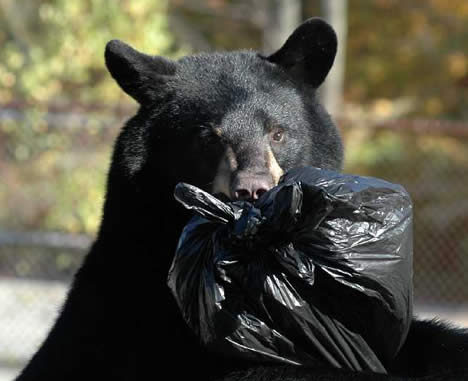
MONTVALE, N.J.—River Vale has its deer, now Montvale has a bear.
Residents near Upper Saddle River Road have been complaining on social media—and to the police and the state’s Department of Environmental Protection’s Division of Fish and Wildlife—that a black bear has been loping through the neighborhood in search of food.
Reports say the bear has knocked over and eaten from at least one garbage can, and parents are frightened for their children and pets.
According to Police Lt. Alisha Foley, the bear was seen a couple of weeks ago in Woodcliff Lake before it made its way to Montvale. She said a smaller bear was seen wandering elsewhere in town.
Fortunately, she said, animal control officers are on the case and they see no signs of aggression in the animals.
“The bear is just minding its own business,” Foley said. “Residents aren’t at risk. They should use safety precautions and go inside if they see it.”
Residents have called the NJDEP to see if they can move in on, tranquilize, and relocate the bear, which they see most consistently in the early morning and evening.
According to a report, the state has yet to get back to them.
Meanwhile, sightings are being posted on the Montvale Residents Wildlife Watch and Advisory, a Facebook group for hobbyists that was created in spring 2016.
The group’s description says the group has no affiliation with the Borough of Montvale and exists for residents to post pictures and stories.
“Any sick animals or injured animals should be stayed away from and reported to Montvale police. … Post warnings and location of bear, coyote, and baby animals so residents can use caution. If a bear is spotted stay away and call police,” it adds in part.
The borough website, montvale.org, has a resource for property owners on how to minimize encounters with bears, which reads in part:
- Secure trash and eliminate obvious sources of food, such as pet food, easy-to-reach bird feeders, or food residue in barbecue grills.
- Use certified bear-resistant garbage containers if possible. Otherwise, store all garbage in containers with tight-fitting lids and place them along the inside walls of a garage, or in the basement, a sturdy shed, or other secure area.
- Wash garbage containers frequently with a disinfectant solution to remove odors. Put out garbage on collection day, not the night before.
- Avoid feeding birds when bears are active. If you do choose to feed birds, do so during daylight hours only and bring feeders indoors at night.
The NJ Division of Fish and Wildlife notes that black bears, the largest land mammal in New Jersey, are integral to the state’s natural heritage and a vital component of healthy ecosystems.
“Black bears are typically not aggressive and tend to be wary of people. They do, however, engage in posturing to intimidate other animals and people when establishing dominance or when they feel threatened,” says the DEP.
Within the most densely populated state in the nation, black bears are thriving and there are now confirmed bear sightings in all 21 of New Jersey’s counties, the DEP adds.
If you encounter a black bear in your neighborhood or outdoors while hiking or camping, follow these common-sense safety tips, courtesy njfishandwildlife.com:
- Do not feed or approach bears!
- Remain calm if you encounter a bear. Don’t run from it.
- Make the bear aware of your presence by speaking assertively, singing, clapping your hands, or making other noises.
- Make sure the bear has an escape route.
- If a bear enters your home, provide it with an escape route by propping all doors open.
- Avoid direct eye contact, which the bear may perceive as a challenge. Slowly back away.
- To scare the bear away, make loud noises by yelling, banging pots and pans or using an air horn. Make yourself look as big as possible by waving your arms.
- The bear may utter a series of huffs, make popping jaw sounds by snapping its jaws, and swat the ground. These are warning signs that you are too near. Slowly back away, avoid direct eye contact, and do not run.
- If a bear stands on its hind legs or moves closer, it may be trying to get a better view or detect scents in the air. It is usually not a threatening behavior.
- Black bear attacks are extremely rare. If a black bear does attack, fight back!
- Report black bear damage or nuisance behavior to the DEP’s 24-hour toll-free hotline at 1-877-WARN DEP (1-877-927-6337).
— Photo of black bear at a Dumpster courtesy NJDEP



